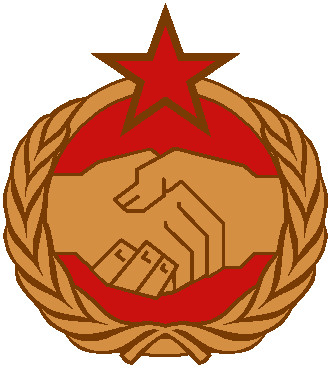Pictured: Colonel Grigori Shtern (left) Marshal Khorloogiin Choibalsan (centre), and General Georgy Zhukov (right), dated 1939.
Quoting History of the Mongolian People’s Republic, pages 345–6:
As the armed raids by [Imperial] troops on MPR frontier posts grew in intensity and assumed a more and more bare‐faced character, they aggravated the tense situation on the eastern frontier of the MPR which had been created in 1936. The peaceful existence and national independence of the MPR became directly threatened. At this dangerous moment for the MPR there rang out all over the world a declaration by the USSR Government to the effect that in the event of Japan deciding to attack the Mongolian People’s Republic by encroaching upon its independence, the Soviet Union would have to help the MPR.2
This declaration furnished fresh proof of the USSR’s peace‐loving policy and of the fraternal, friendly relations between the USSR and the MPR and of the readiness of the Soviet people to help the MPR protect its independence; it strengthened still further the friendship of the Soviet and Mongolian peoples, inspired the Mongolian people with new strength. The Protocol on Mutual Assistance between the USSR and MPR, signed on March 12, 1936, following this declaration, linked still more closely together the destinies of the two brother nations and formed a sure guarantee of the independence of the MPR.
In conformity with Articles 1 and 2 of this Protocol the two Contracting Parties, in event of a threat of an attack on the territory of the USSR or the MPR by a third State, undertook immediately to confer on the situation so created and to take all such steps as might be required to guard against the danger and to afford one another every possible assistance, including military assistance.
The Protocol on Mutual Assistance, which enlarged upon and put into legal form the [unwritten] agreement of 1934, was exceptionally important for safeguarding the independence of the MPR. This document demonstrated the unshakable determination of the Soviet and Mongolian peoples to make joint efforts to defend peace in the Far East and protect the MPR against aggression by […] imperialism. The Protocol on Mutual Assistance was a striking expression of the peaceful foreign policy of both states, which was based on the principle of equality of rights, mutual respect and friendship of the peoples.
The Plenary Meeting of the MPRP Central Committee (March 1936) and Twentieth Session of the Little Hural laid special stress upon the growing danger of external attack and approved the steps taken by the government to reinforce the country’s defence capacity and develop the economy. In order to intensify the struggle with counter‐revolutionary elements inside the country, the Meeting approved the reorganization of Internal State Security as part of the Ministry of Internal Affairs.

